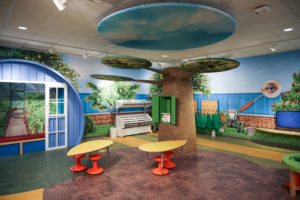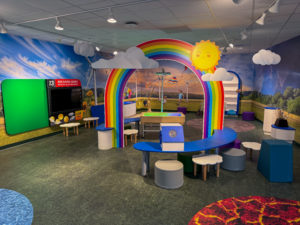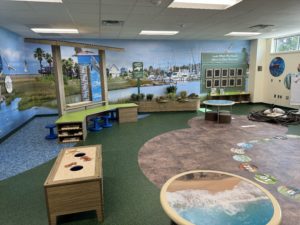Since 2003, Exploration Zones by Exhibit Concepts® has transformed traditional educational institutions into museum-quality, interactive learning experiences. These experiential learning classrooms and resources have provided an opportunity for young children to transcend to a place where they can use their imagination and become immersed in a world of inquiry and possibility. Exploration Zones by Exhibit Concepts® understands and values a play-based learning model, which is the foundation of experiential education for early learners.
Play is how young children learn. We are excited and passionate about providing these environments for young children to create, explore, and build inquiry skills. Many of us remember going on a trip to the zoo, museum, or aquarium as children and even as adults. You may remember touching a lunar rock at the planetarium and making a connection to the moon. Or maybe you remember hearing a lion roar, and the sound inspired you to learn more about animals. These informal learning environments play a pivotal role in how we take in the world around us.
Often called experiential learning, informal experiences are estimated to make up between 70-90% of our learning over the course of a lifetime. Experiential learning is a theory that acknowledges humans as active participants in the learning process. Experiential learning environments, like museums and zoos, naturally provide opportunities for inquiry-based learning that inspire curiosity and passion. These same opportunities are available in experiential learning classrooms.
In an experiential learning classroom, children are at the center of the learning process, actively engaging and participating in decision-making. Students’ interests and needs drive the topics of study with a small group and individual projects evolving from curiosities and real-life events. Teachers and early childhood educators help guide learning by observing and listening to learners, making assumptions about what they already know, and providing new and novel materials, activities, and experiences. Teachers and early childhood educators also ask open-ended questions, which is key to supporting children’s language development and encouraging critical thinking. Open-ended questions and prompts allow children to provide full and meaningful responses that depict their thoughts and ideas. These questions and prompts are naturally used throughout an experiential learning environment and help children share their growing understanding of the world.
We know that young children learn best by actively engaging with their environment, which includes listening to sounds, observing things, responding to questions and prompts, and playing with new and novel items. Experiential learning environments are an authentic avenue for participating in these types of activities. They are designed to replicate real-world concepts and themes. As the children interact with the environment, each student’s learning experience is guided by their unique perspective, making experiences individualized. They choose what to engage with, how to engage with materials and activities, and how to share new information with their teachers and each other. Experiential learning environments give children a sense of accomplishment that will help develop their self-esteem and spark curiosity and a desire to learn.
Most of all, experiential learning environments are fun. Children are excited to come to school and create their own learning. They are guided and encouraged, but “doing” is entirely up to them!
Exploration Zones by Exhibit Concepts® is the only design-build firm that offers full educational support and classroom resources that are unique to each themed learning environment. As a company with a vision to constantly grow and evolve, coupled with many years of experience, it was a natural progression to include education centers in our portfolio of work. Quality early education sets the stage for a lifelong love of learning, and it’s our vision and interest to be innovators in the field and to continue providing cutting-edge spaces for young learners.



